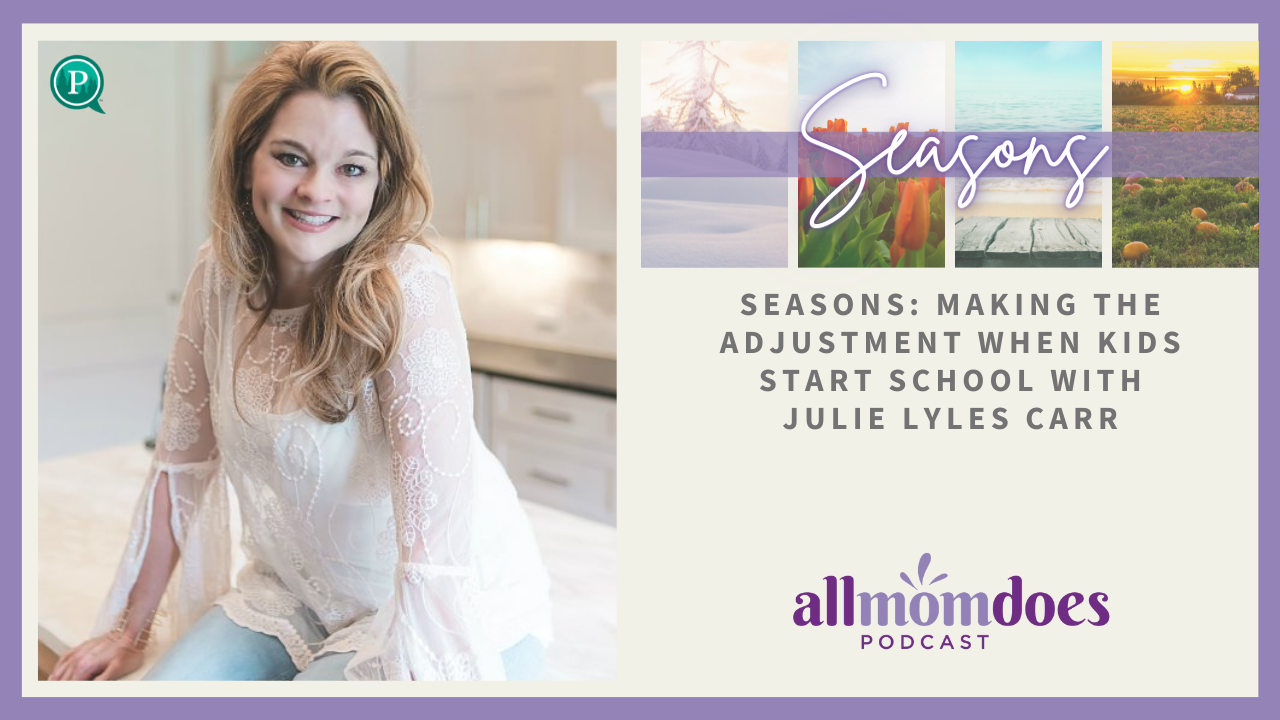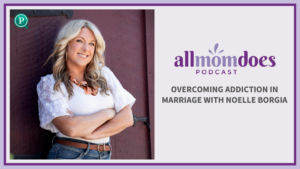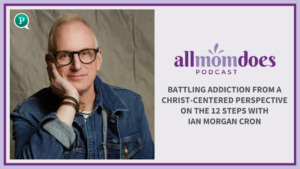Talk about a big season in a parent’s life! Whether your kid started their first day of preschool this year or if you dropped off your youngest child for their freshman year of college a few weeks ago, our kids heading to school is a big season of change in our lives and theirs. So how do we keep it all in perspective? Mom of eight and host of the allmomdoes podcast Julie Lyles Carr shares the wisdom and mistakes she gathered along the way in her season of kids and school in our series on Seasons.
Interview Links:
Julie Lyles Carr: Website | Instagram | Facebook | Twitter | Pinterest
Julie’s Book: Raising an Original
All Mom Does: Instagram | Facebook | Twitter
Transcription:
I’m Julie Lyles Carr, this is the Purposely Podcast Network, and you’re listening to the All Mom Does podcast. Thanks so much for being with me today. We have been in a series that we have called, Seasons. We have looked at seasons in our lives, and today we’re going to dig into one that I know is right in the center of your radar for a lot of you, because you have either just launched kids to go to school or you’re in the thick of it, or you are aware that next year you’ve got a little one who’s gonna go to preschool or go on to kindergarten, and that season coming upon you or that season that you find yourself in is starting to feel a little overwhelming. And so we’re gonna unpack what that’s like when kids start school, making the adjustment when that season comes into your season of life.
Now, I have to tell you that I never really thought a whole lot about what we were gonna do when it came to our kids and school, because it just seemed very obvious to me with our first child that of course she would go to preschool, and then she would go to kindergarten, and then she’d go to first grade, and second grade, and all the way through, and then she’d go to college. The end. So I just figured, oh, this is not really something that I have to really think through a whole lot cuz she’s just gonna go and do it. And yet that entire entree into education ended up having far more layers than I ever would’ve expected.
I don’t know if it’s because part of it was in my family of origin. It was just very simple. I mean, that’s what we did as kids. We went to preschool and then we started at the local elementary school and just went all the way. My in-laws are, were both principals, elementary school principals. And so that form of education was just part of what my husband grew up with. And so I was not necessarily really prepared when I began taking a look for my first child’s education and trying to figure out what we were going to do, and what that season was going to mean. Ultimately, my oldest did go to preschool and I was alongside her as a teacher at that preschool for quite a while. And then we did have her go into a Christian private school for her pre-K experience. And then we actually kept her home one year, her kindergarten year, and then she went to public for a couple of years, and then we made another transition.
So all of those decisions that you’re having to make when it comes to your kids and getting into school, we could talk on that for a whole long time, I’m sure, with all kinds of questions and different inquiries about how to do certain things, and why we made certain decisions. But here’s what I really want you to hear. When you’re entering this season and you begin to observe in yourself the opinions you have, the feelings that you’re having, be sure and mark those down. Because here’s what I learned with my own kids as we began this season of their education, how you’re feeling and what your opinions are surrounding that are great indicators of how you’re doing in your own personal growth, how you’re doing in your spiritual journey, and how you’re doing in your own personal interest.
One of the things that I have found really fascinating is, I have seen moms taking that first kiddo to kindergarten, have the same kind of emotions and reactions that they ultimately have when they then take that kiddo to be a freshman in college. There is definitely something that happens to us in those seasons of launch for our kids, particularly in educational pursuits that all a sudden we are being, it’s not demoted, that’s really not the right word, but the position that we’ve had in our kids’ lives is changing. We are opening up a whole different panel of other people’s opinions and observations about our kids. And sometimes, let’s face it, you hit it outta the park, you get a teacher who’s fantastic, who loves your kid almost as much as you do, and thinks your kid can do no wrong. And sometimes you can end up in a situation where when you are launching that kid, whether it’s kindergarten, or their freshman year of college, you’re launching that kid and you are suddenly subject to a whole lot of other feedback and input from people that you didn’t expect.
And so it’s a great indicator to you as you begin that process. Are you fearful about sending your kid, or about opening up into an educational decision? Because this can apply too to a season, to deciding that you’re going to homeschool, because you will definitely have people in your world who have a lot of opinions about that, people who are very supportive, people who think that you’re a little cuckoo for doing this. So where are you in your personal growth, in your own spiritual time, in the decisions that you’re making before God, and in prayer? How is all that correlating to how this feels right now in your world? Don’t miss that opportunity to do a little self-examination.
The other thing that I found too as I’ve launched my kids into various different seasons in their educational, in their educational experiences is I’ve found that if I’m sort of relieved and shoving them out the door, if you will. And this is a no-guilt thing, okay. But I may have allowed some things to creep into my own personal interest and workload that are making me feel a little overwhelmed, and kind of getting the kids out feels good. But maybe I need to examine that just a little bit. Maybe where I really want that level, that bead and the level to be is somewhere closer to, I’m excited for them to go, but I’m also making sure I have enough margin in my own world and in the things that I’m doing and chasing and my responsibilities, that I don’t feel overwhelmed when they’re home. If I’m feeling overwhelmed when they come back in from the classroom, I probably need to take a little look at that.
Now, of course for many of us, we had a very weird season because none of us, for the most part, expected during the pandemic that we would have to be the ones, particularly if our kids were in private or public-school situations, where now the kids are home, but were having to facilitate someone else’s schedule. For those of us who were already homeschooling, that season was also interesting because in our homeschool journey, we certainly have used a lot of different opportunities in our community for classes that the kids take, or for PhysEd kind of experiences, where that was both for socialization and they were outta the house. And so I would have some time on Wednesday afternoons where they were off doing this different phys, you know, PhysEd type experience, PE. And all of a sudden, we weren’t having all of that.
And so that season in of of itself, I think heightened a lot of people beginning to look up and go, wow, what do I know about my children’s education? How do I feel about it? Is it something I maybe need to be a little more involved in? Is it something that I’m rethinking now because I’m seeing more of what their experience is? So that season in and of itself was a great indicator, not trying to be Pollyanna, not only trying to look for the silver lining, but there were some great blessings that came out of that season for all of us when it comes to looking at our kids’ education and what that means.
So however you’re feeling, let’s say you’ve just taken your last kiddo to college and you are really feeling that sense of empty nest, you’re really feeling a little bit at odds, like you’re not quite sure what to do with yourself. Acknowledge that feeling. Acknowledge that there’s a grief involved in transitioning into a new season sometimes for us. Even when it’s a great thing, but also use it as a moment to do a self-check and say, huh, you know, I was real wrapped up in my kids’ lives. And now there is an opportunity to take that same energy, that same mothering energy, that same level of interest, and use it to help serve other people. Use it to help learn something new. Use it in a way in this next season of my life, that can be powerful. You may find if you have little ones that you’re just getting into school for the first time that you experience some of those same emotions. You have been so on site and on task, making sure that the sippy cups were full and making sure that you were cleaning up every mess that was coming along and trying to keep your kids entertained throughout the day, that having them in a, an educational system now, into an educational experience, you’re a little bit at loose end.
Now you may be a listener who’s like, Yeah, well, I launched the oldest one back into school, and now I’m home with these two other little ones, and I’m not really sure what to do with myself because now I’m recognizing how much that older one has been part of keeping these younger ones entertained, has been someone I could rely on as another set of eyes, has been someone who could run and go grab the diaper kit for me when somebody needed to be changed. When you notice that, be sure and verbalize that to your child, not in a way that puts baggage on their shoulders. But in a way that says, hey, I want you to know this. I love that you are in school and you’re having fun, but I want you to know that I notice when you’re gone and so do your siblings because you are so great when you’re here, you’re just so helpful. You help play with the other kids. You are so great to help me in the kitchen or to go grab things. Thank you for the way that you do that for me, and I just want you to know that I notice that.
So as you’re entering this season, as school has reved back up, as we’re all getting back into the groove, we’re, regardless of what your school choices are, make sure that you are noticing how you are feeling in this back to school season. Write it down, journal it. It doesn’t necessarily mean if you’re having some strong emotions around some things that you need to change something. It simply means that you’ve got a great indicator there of maybe where things are a little bit out of balance or maybe where you’ve done some things that you can feel really good about and that you can say, wow, you know, Lord, thank you for guiding us in some of these decisions. So be sure and note that in this season.
Now, here’s a second really important part of the back-to-school season. Wherever you land in this world, this is so important. Your kids need to see that you trust and have confidence that they can handle this season of their lives. If you have a kiddo heading into kindergarten, and you seem to be very nervous, your child may interpret that is you are nervous that they can’t handle it. If you have a child who’s headed to college and you are still on the phone almost every day because you are really struggling with giving them some space and giving them some independence, the message you may be unintentionally communicating is that you are not sure they can handle the college experience. It puts a burden on our kids. Now, I’m not talking about denying your emotions around the transition. What I am saying is being very intentional to manage your emotions with a trusted mentor, with your spouse, with a good friend, with your counselor. I think that is incredibly appropriate and smart. And of course, I think you should let your child know if you’re missing them. Sure, convey that. But we need to be really cautious that in a season where we’re working through our own emotions with such a change as our kids moving into their educational worlds, that we aren’t unintentionally saying to our kids, I am not feeling confident about you being able to handle this, because they’re going to internalize that. They’re going to think that maybe mom doesn’t think I am capable of doing this. Maybe dad isn’t too sure that I can handle this next phase in my life. That is such an important moment for your child to know that they’re loved that you’re gonna miss ’em, but that you also know they can do it.
Now, let me speak to you homeschooling moms and dads for a moment. Yes, those of us who homeschool, we really do have a lot more hands on. We aren’t necessarily going through the same kind of transitional season with our kids that having our kids away from us in a public or private school all day or having our kids away at college. Obviously when we’re educating our kids in our home, we are definitely right there. We’re watching more of it, and we’re probably not having to grapple with as many of those transitional emotions as those parents whose kids are going through more “traditional” school routes. However, it’s important for our kids to know that we see each season. That they are growing, they are maturing, and that they can be entrusted with greater and greater responsibilities.
If you have kids who are in those high school ages of homeschooling and you are still having to hover over them to get their work done, you’re conveying to them that you just don’t think they’re capable. And your kids may be really pushing you on this. I get it. We have homeschooled at some season, all eight of ours, and I had kids that by the time they hit certain ages, some of them at the age of 8, 9, 10, they were just ripping through stuff on their own and doing very, very well. It was almost like I was there as an educational consultant to them, but I wasn’t having to stand on top of them. And then I also have those kids where I was having to stand on top of them. But in all of that, what my hope with my kids, and what my hope for yours is, that as we’ve moved through each season, we’ve tried to communicate, sometimes imperfectly, sometimes well, sometimes not, but we’ve tried to convey at each stage, hey, you are moving into a new season in which you’re getting closer and closer to launch. And because you’re getting closer and closer to launch, I want to know that I’m entrusting you to handle certain responsibilities surrounding your own education, because I think you can do it. I know you can do it.
So even if you’re not grappling with that place of going, oh wow, we’re moving from half day kindergarten to full day first grade, and that feels a little, huh? Feels a little nerve wracking. Even if you’re not dealing with those kinds of transitions, there should be something to mark that, yeah, moving from homeschool kindergarten to homeschool first grade, there’s some things that your kids should be entrusted with, and you should be communicating that to them because our kids are looking to us in each new season of their lives to see if we think they can do it. And they need to see written all over your face and they need to hear from you that, you know, they can do it.
And then lastly, I wanted to share this with you when it comes to talking about seasons, and education, and kids going back to school, and kids starting college, and all of the things, I wanted to read to you from my book, Raising An Original, because part of what I dealt with in that book is that we have these conventions in our culture, right, when we’re raising kids that make us feel like we’re helping get them on the road to “successful” lives. Sometimes those things line up with the personality styles and the originalities that our kids have. Sometimes they don’t, and we are pushing in ways that might not be the best for our kids.
And so I wanna read to you from a chapter that was entitled, It’s Not Just About Getting Them That Degree. Okay, let me just say that again, It’s Not Just About Getting Them That Degree, and I start out with a quote: “Educating the mind without educating the heart is no education at all.” Central Mississippi, 1940. Log cabin built under a big oak tree, dirt floor. That’s where my father was born. Born to good, decent sharecroppers, doing their best to coax butter beans and tomatoes from the mercurial Mississippi red clay. From his rural beginnings, my dad went on to become a rocket scientist. Literally, if you were to have asked him how one makes a quantum leap like that, his answer would’ve been immediate and sure. Education. Early on, I learned that education was the ticket to achievement. It had been my dad’s way out of a humble beginning to trafficking in the cosmos. When you have that kind of a dad, any excuse you come up with for poor grades is never good enough. It’s a new take on the classic, I walked to school two miles in the snow uphill both ways. My dad could always up any conversation about education with his story of growing up on a tiny plot of farmland with only a few pairs of overalls to his name. My dad’s parents were sweet, hardworking, decent people. They adored their two boys, were committed to their church and shared whatever they could grow with their neighbors. When crops failed, they headed to the Gulf Coast so that my grandfather could work in the shipyards. My dad’s father died at the age of 64. His lungs scarred from the emphysema he developed smearing asbestos on the inner lining of ships and his back permanently hunched from a lifetime of hard physical labor. It was my dad’s older brother Bill, who first saw the potential of obtaining an education beyond the small country school he and my dad attended. Uncle Bill figured out a way to finance a college education for himself by signing up for the Army. In doing so, he cracked open the door for a wider world for my father. Bill became the first of the family to attend college, and when my dad graduated from high school, he followed suit. My dad’s high school grades were not meritorious. His preparation for college not stellar, and his financial backing, non-existent. Nevertheless, the vision took hold and the fire ignited. During summer breaks from college, my dad returned to the small town on the Gulf Coast where his parents were now living. Like his father, he did backbreaking work in the shipyards. Summer earnings saved, he’d head back to the university in the fall where he would subsist on cheese sandwiches and carefully rotate his wardrobe of two shirts and one sweater. He studied and he studied some more. The door that his older brother had shouldered open gave my dad a glimpse of something beyond his rural upbringing and hard scrabble labor. He spotted possibilities perimeter, a sliver of the place where his curious mind and inventive streak just might find resonance. The completion of one degree led to higher degrees in specialization. Yes, my father’s academic achievements opened doors to the heavens and the stars. It afforded him impressive letters after his name and provided well fiscally for our family. But as remarkable as all that is, it doesn’t tell you anything about my dad’s character. It doesn’t tell you if he lived a fulfilling life or a fractured one. It doesn’t tell you if he performed his work with integrity or if he used nefarious methods to secure contracts with NASA. It doesn’t tell you if he fulfilled the purpose and call on his life. And it certainly doesn’t tell you anything about his relationship with God. Lest do you think I’m belittling the place and importance of education for our children, that I’m being disparaging about the minds and possibilities that learning can open. Please know that I’m a huge advocate of the blessing of an education. In fact, it’s also part of my spiritual history. One of the great grand gifts of the Reformation was a drive toward literacy for all societal ranks so that people could read the Bible for themselves. That shift alone has had a massive impact on literacy rates as well as faith in general. I have dear friends who work in the field of education whom I respect and honor deeply. They are devoted to their profession, to their students, to the culture of learning. I couldn’t be more proud of them. Couldn’t be more thankful. And they are fighting an uphill battle. The statistics regarding our country’s educational system hit hard. There’s an expectation that teachers, besides actually teaching the curriculum, will be the primary source of character formation, moral advancement, and destiny development for their students. And that’s despite dismal budgets, lack of parental involvement, and crowded classrooms. No wonder teachers are leaving the classroom in unprecedented numbers and finding other jobs, they simply can’t meet the unrealistic expectations heaped upon them. We’ve arrived at a place where we’ve loaded so many non-academic expectations on our school systems. We’ve also come to a place where we believe that academics will provide all the purpose and navigation we need for life’s journey, and we’re placing those towering expectations on an overwhelmed and underfunded system that was never intended to provide character formation and moral direction for its students. Make no mistake, education is important. It’s also expanding and equipping. Secular parenting philosophy would have us believe it’s about the most important thing we can do for our kids. It certainly helped transform the trajectory of my own family of origin, taking my dad from a sharecropper’s beginnings to developing engines and systems that put people on the moon. My in-laws spent their careers as elementary school teachers and principals, both of them exactly the kind of loving, conscientious people you would want to guide your child’s education. However, education is a tool. Yes, it is powerful, but its primary function is not to reveal destiny or individual sparkle. When we place the unfair expectation upon our educational system to provide our kids with spiritual wisdom and life mission, we oversell what education can do and undersell our responsibility as believing parents. We’ve got some rewiring to do. Here in the US, we spend more money per student than any other country in the world while reaping less than impressive results. We’ve placed a huge premium on what we think education can do. We wring our hands that our students are being outperformed in science by students in South Korea. We fret that German kids have higher math scores, but when we take a deeper look, we see that South Korean students have some of the highest suicide rates in the. Even here in the us, some of our most prestigious universities like MIT also have high suicide rates. We’ve got some serious rethinking to do when it comes to evaluating success based on scholastic measures alone. Are we willing to sacrifice quality of life, even length of life for higher test scores? To me, that feels like sacrificing our kids. It’s easy to fall into the trap of placing more faith in S A T scores and Ivy League pedigrees than in the God who knit us together. I get it. I come from a home that sent a strong message about education, and then I married into a family of educators, so it’s no surprise I was determined to procure the finest education I could find for my kids. No sacrifice would be too great. No inconvenience, too overwhelming. I could have shipwrecked Michael and myself financially on the rocks of obtaining a premier Christian education for our oldest daughter, Madison. In the season where Michael was building a new business and our budget was being held together with duct tape and Popsicle sticks, an unexpected tax refund convinced me that this was God’s way of providing Madison an education at the top Christian school in our community. I pushed and haranged and plead with Michael for us to use the unexpected refund as tuition for this exemplary school. I argued that her academic career was critical that her future hinged on being educated at the best school, that we needed to be willing to make whatever sacrifices necessary to ensure scholastic success. And so we headed for the administrative office, checkbook in hand, paperwork regarding Madison’s intelligence and aptitude carefully filled out. After rigorous testing and an interview process, Madison was accepted. I was ecstatic. And so Madison began her gold plated upper crust education, uniforms, and educational theory in abundance. She became an elite student. Grade? Pre-K. Yep, pre-K. People, please. PreK? Did she have a fun year? Yes. Was the school a sweet place with caring teachers in a positive learning environment? Absolutely. Was it worth the financial craziness that resulted from putting that many of our scarce dollars toward a top shelf scholastic experience? Um, no. It’s not that private education or public education or homeschool or charter schools are superior or inferior or neutral, it’s that I had put far more trust and investment in a select pre-K program than I did in God’s ability to use whatever educational model worked best for our family situation and budget. Our misplaced trust made financial chaos of our year as we scrambled to cover basic bills while dropping off Madison twice a week in a carpool line that boasted vehicles costing more than our house. And when the year came to an end, I hadn’t learned any more about Madison, about her curious threads, than when we’d started, other than the fact that she tended not to eat the sandwiches I packed for her school lunch if I put mustard on them. For as much money as we paid and as nice as the school was, they weren’t all that interested in finding out what made Madison tick, what made her an original. Understandably, they were more concerned with maintaining the impressive testing scores and academic record of their total student population. Group dynamics, if you will. Here’s some shockingly good news. God is not limited or empowered by your kid’s mediocre or sparkling academic record. God can absolutely use someone who is a poor speller. It’s not a moral failure if your kid isn’t great at math. Educational success is not the same thing as spiritual success.
I read that to you because in a season focused on education, on getting kids launched well into their school year, I wanna remind you, I wanna remind myself that yes, education is powerful. But it’s about the totality of the kids we’re raising, not just how well they’re doing on the spelling test, not just how well we’re kicking our way through the homeschool curriculum. In a season where so many of us are focused, so much of our day, potentially, so much of our budget, so much of our time, so much of our time sitting in the carpool line, all the things when so much of our focus is being spent in this season on education. I just wanna encourage you and myself that that is not all that this season is about. Our kids being in school, making the adjustment to our kids being in school at whatever grade level that is, education is part of it. But their upbringing, the development of their character, them being celebrated for the original threads that God has placed in their lives, that that needs to be the overwhelming umbrella under which this season of education for our kids resides.
And then there’s this. I believe that learning should not be something that’s just a season in our lives. We’ve talked with our kids long and hard about always being in the process of learning, being lifelong learners. That’s part of what I love in scripture, both the study of scripture and what scripture has to show us. I look at someone like Nicodemus. Here he is, part of the highest counsel of Jewish religious leaders, and he discovers that he still has more to learn when he encounters Jesus. I look at Paul who thought that he had the whole system locked down. He had been educated in some of the best schools that his time had to offer, that his community had to offer. And yet when he learns of the gospel, everything in his life changes. I want my kids to know that while attending school, while being at a university, while being at a private Christian school, while being in public education, while being homeschooled at our table, is a season. It is a season that will end with a graduation. It does not mean that the lesson of learning, of always being about learning has its own season. No. Lifelong learning is just that. It’s for life. I wanna model it for my kids, I wanna ask you to model it for your kids, that we not think of learning as something that only happens K through 12 or K through bachelor’s degree. But that we are always in the process, just like the spirit of Caleb. As Caleb was getting ready to lead people into the promised land, he was 80 years old and God says that Caleb has a different spirit, that Caleb was someone who was just as vigorous because he was always about teaching and learning the art of warfare to help lead the next generation.
So as you’re in this season where so many things are focused on back to school night and PTA and getting through the homeschool curriculum, I wanna ask you this. Let your feelings be an indicator of how things are going, how you’re doing in terms of letting your kids grow and take on new independence. Make sure your kids see that you trust them to be good students, to walk into their next seasons, that they are capable, that you know that they can do great things. And let’s always remember that this season of educating our kids, it is not just about getting them that degree, that it is about the people they are becoming.
I can’t wait to talk with you next time on the All Mom Does podcast. We’re going to launch into a recap of some of the great things that we’ve talked about in this series on seasons, and I have some thoughts for you on that. So I’ll see you next time. And hey, be sure, and we would love it if you would leave us a five-star rating and review for the podcast wherever you listen to your podcast. It really, in all the mysterious way that the algorithm works, it really helps people be able to find the podcast, which is such an incredible blessing to us when you’re willing to take a little bit of time and do that. So be sure and leave that five-star rating and review. And you might just hear your review read right here on the podcast.
Be sure and check out those show notes. Rebecca is so faithful to get those out for us and you can find all kinds of great resources and links and I’d love to connect with you over on Instagram on Julie Lyles Carr over there. Also check outAll Mom Does on all the socials and on AllMomDoes.com. Thanks so much for being with me, and I’ll see you next time on the All Mom Does podcast.
Follow this podcast:







